|
 Secure Site
Secure Site
|
 |
 Digital Zen Alarm Clock Meditation Timer Digital Zen Alarm Clock Meditation Timer
Meditation is generally an inwardly oriented, personal practice, which individuals do by themselves. Meditation may involve invoking or cultivating a feeling or internal state, such as compassion, or attending to a specific focal point. The term can refer to the state itself, as well as to practices or techniques employed to cultivate the state. There are dozens of specific styles of meditation practice; the word meditation may carry different meanings in different contexts. Meditation has been practiced since antiquity as a component of numerous religious traditions. A 2007 study by the U.S. government found that nearly 9.4% of U.S. adults (over 20 million) had practiced meditation within the past 12 months, up from 7.6% (more than 15 million people) in 2002.
Although meditation can be done in almost any context, practitioners usually employ a quiet, tranquil space, a meditation cushion or bench, and some kind of timing device to time the meditation session. Ideally, the more these accoutrements can be integrated the better. Thus, it is conducive to a satisfying meditation practice to have a timer or clock that is tranquil and beautiful. Using a kitchen timer or beeper watch is less than ideal. And it was with these considerations in mind that we designed our digital Zen Alarm Clock and practice timer.
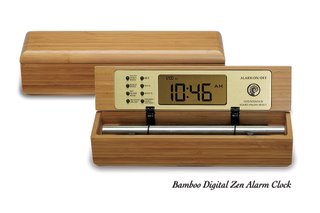 Meditation Timer
This unique “Zen Clock” features a long-resonating acoustic chime that brings the meditation session to a gradual close, preserving the environment of stillness while also acting as an effective time signal. The Digital Zen Clock can be programmed to chime at the end of the meditation session or periodically throughout the session as a kind of sonic yantra. The beauty and functionality of the Zen Clock/Timer makes it a meditation tool that can actually help you “make time” for meditation in your life.
 Now & Zen's Meditation Timer Shop - Boulder, CO
Now & Zen’s Meditation Timer Shop
1638 Pearl Street
Boulder, CO 80302
(800) 779-6383
Posted in Bamboo Chime Clocks, Zen Timepiece by Now & Zen
 sacred spaces Create a personal meditation space that inspires your practice and invokes your higher self.
By Sandra Anderson
If you’re a gardener, you know the value of choosing an ideal site and preparing quality soil for nurturing healthy plants. The same is true for tending to your inner growth: when you devote a nook in your home to your practice and sow it with your higher intentions, you create the right conditions for your spiritual life to thrive.
A dedicated space collects and focuses your energy, removes uncertainty about where to practice, and, through habit and association, helps the mind move inward more quickly and deeply. Much like an encounter with the refrigerator conjures thoughts of food, and a glance at the couch invites a comfortable sprawl, catching sight of your meditation seat in a sanctified space will evoke your deepest yearnings and inspire you to do your practice.
Choose a place that can become a sanctuary—a quiet, private space protected from outside distractions and out of public view. You may be fortunate enough to designate an entire room, but a corner in your bedroom will suffice.
 Carved Wooden Thai Buddha with Singing Bowl You’ll need a meditation seat—traditionally known as your asana—which may be a neatly folded blanket topped by a cushion for support, or even a chair or bench. Keep any additional props needed to support a comfortable sitting posture nearby, as well as your mala, shawl, or journal; but otherwise keep the space uncluttered and scrupulously clean.
A simple altar will serve as the heart of your space, calling you to your practice by providing inspiration and focus. An altar is an acknowledgement of the deeper essence of life and a bridge to the unseen—a link between our life in the world of elements and the subtle world. All altars, even public ones, serve to remind us of meaning and purpose in life, and connect us to inner strength and guidance. In religious or ritual settings, an altar is the locus for offerings made to ancestors or deities. In the context of yoga meditation, an altar inspires an offering of inner resources rather than outward ceremony or ritual, so simplicity is key.
Try a small low table or a small chest of drawers at eye level, with a tasteful and simple covering. The objects you place upon your altar give focus, substance, and energy to your highest intentions. Traditionally, a flame (from a candle or a ghee lamp), water, flowers, fruit, and incense are offered on an altar to represent the gifts of the world given to us through the five elements. Often, these are joined by objects from a pilgrimage—a stone, sanctified water, or a sacred representation (such as a picture of Our Lady of Guadalupe or a carving of Lord Ganesha). The objects themselves are not as important as whether the altar uplifts the mind and touches the heart.
By creating a sacred space that encourages you to cultivate and nurture a devoted practice, you are one step closer to tasting the fruits of yoga—unconditional well-being and pure awareness.
Our Zen Timepiece’s acoustic 6-inch brass bowl-gong clock & Timer is the world’s ultimate alarm clock, practice timer, and “mindfulness bell.” It awaken you with the beautiful tones of a singing-bowl, used by many sound therapist.
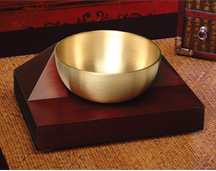 Singing Bowl Timer It fills your environment with beautifully complex tones whenever it strikes. In the morning, its exquisite sounds summon your consciousness into awakening with a series of subtle gongs that provide an elegant beginning to your day. Once you experience the Zen Timepiece’s progressive awakening, you’ll never want to wake up any other way. It also serves as the perfect meditation timer. Available in 5 wood styles, including bamboo.
Remember to set your Singing Bowl Timer for 20 minutes each day – for a lovely meditation in your new sweet sanctuary.
 Now & Zen's Showroom, a place to find meditation tools and clocks Now & Zen’s Singing Bowl Timer Store
1638 Pearl St.
Boulder, CO 80302
(800) 779-6383
Posted in Goodness
 meditation trains your brain Using a magnetic resonance imaging (MRI) machine, Eileen Luders, a re-searcher in the Department of Neurology at the University of California Los Angeles School of Medicine, looks for evidence that meditation changes the physical structure of the brain. Until recently, this idea would have seemed absurd. “Scientists used to believe that the brain reaches its peak in adulthood and doesn’t change—until it starts to decrease in late adulthood,” Luders says. “Today we know that everything we do, and every experience we have, actually changes the brain.” Indeed, Luders finds several differences between the brains of meditators and nonmeditators. In a study published in the journal NeuroImage in 2009, Luders and her colleagues compared the brains of 22 meditators and 22 age-matched nonmeditators and found that the meditators (who practiced a wide range of traditions and had between 5 and 46 years of meditation experience) had more gray matter in re-gions of the brain that are important for attention, emotion regulation, and mental flexibility. Increased gray matter typically makes an area of the brain more efficient or powerful at processing information. Luders believes that the increased gray matter in the meditators’ brains should make them better at controlling their attention, managing their emotions, and making mindful choices.
Why are there differences between the brains of meditators and nonmeditators? It’s a simple matter of training. Neuroscientists now know that the brain you have today is, in part, a reflection of the demands you have placed on it. People learning to juggle, for example, develop more connections in areas of the brain that anticipate moving objects. Medical students undergoing periods of intense learning show similar changes in the hippocampus, an area of the brain important for memory. And mathematicians have more gray matter in regions important for arithmetic and spatial reasoning.
More and more neuroscientists, like Luders, have started to think that learning to meditate is no different from learning mental skills such as music or math. Like anything else that requires practice, meditation is a training program for the brain. “Regular use may strengthen the connections between neurons and can also make new connections,” Luders explains. “These tiny changes, in thousands of connections, can lead to visible changes in the structure of the brain.” Those structural changes, in turn, create a brain that is better at doing whatever you’ve asked it to do. Musicians’ brains could get better at analyzing and creating music. Mathematicians’ brains may get better at solving problems. What do meditators’ brains get better at doing? This is where it gets interesting: It depends on what kind of meditation they do.
Over the past decade, researchers have found that if you practice focusing attention on your breath or a mantra, the brain will restructure itself to make concentration easier. If you practice calm acceptance during meditation, you will develop a brain that is more resilient to stress. And if you meditate while cultivating feelings of love and compassion, your brain will develop in such a way that you spontaneously feel more connected to others.
The Zen Meditation Timer and Clock’s long-resonating Tibetan bell-like chime makes waking and meditating a beautiful experience – its progressive chimes begin your day with grace.
adapted from Yoga Journal, By Kelly McGonigal
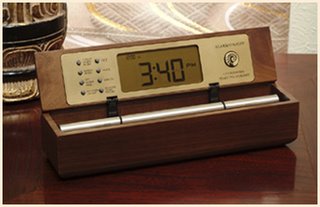 Digital Zen Alarm Clock, a meditation timer and progressive alarm clock Now & Zen’s Meditation Timer Shop
1638 Pearl Street
Boulder, CO 80302
(800) 779-6383
Posted in Bamboo Chime Clocks, intention, Meditation Timers, Meditation Tools, mindfulness practice, Now & Zen Alarm Clocks, Zen Timers
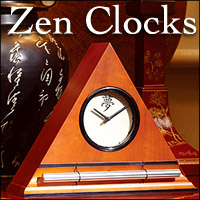 Musical Zen Clocks
Your Zen Alarm Clock is like an acoustic musical instrument. You may have to adjust its sound to your taste. Adjust the sound of the chime by firmly scooting the chime bar up or down on the string. You may have to push one end and then the other in an interative process to change the position of the chime bar relative to the tip of the striker. As you move the chime into slightly different positions, continue to test the sound of the chime strike by turning the alarm switch on and off as you move the chime bar up or down.
 Violin The chime must be centered horizontally and vertically in front of the striker for a strong and clear chime. If your chime makes a clicking sound, or if the strike seems weak, try moving the chime by scooting it up or down on the string one side at a time until it is adjusted to the optimal position such that the striker contacts the alloy bar squarely when it strikes. If your clock stops working, or the chime grows weak, try replacing the batteries.
 B Tone Digital Zen Alarm Clock in Bamboo by Now & Zen The Chime’s tone, the Digital Zen Clock comes in either a 7 inch “B Tone” or a 9 inch “E Tone” chime. These long-resonating acoustic chimes have been hand tuned using the natural Pythagorean tuning method to produce the same frequencies as the tuning forks used by musical therapists. The chime strike force can be set to “Low” or “High” to create a tone optimal for you.
 Listen for "Sweet Spot" when Adjusting your Zen Chime Clock To adjust the chime to its “sweet spot,” set the countdown timer in repeat mode so that it is striking repeatedly every 10 seconds. As you listen to the continuous strikes, adjust the position of the chime bar on the string by moving it forward or backward until the chime sound is optimized. The string is strong so you don’t need to worry about breaking it.
Now & Zen Headquarter Store
1638 Pearl Street
Boulder, CO 80302
Posted in Now & Zen Alarm Clocks
 The Practice of Mediation- Communing with Divinity The Practice of Meditation: Using the Chime Clock to End Your Meditation
In the practice of meditation, there are many forms and theories of meditation, two basic approaches emerge. These two basic types of meditation can be characterized as “meditation with form” and “meditation without form.” In meditation with form, the practitioner focuses on contacting his or her Higher Self, or communing with Divinity. Meditation with form can also involve creative imagery and visualization. Meditation without form concerns going beyond thought into emptiness––transcending the ego-self.
But no matter which type of meditation you choose to practice, meditation is more than simply entering into a dream-like or alpha state. In the practice of meditation you will inevitably progress through a series of developmental stages as you become more adept at journeying deeper within yourself.
 The Practice of Mediation- Japanese Leaves Dial Face in Burgundy Finish by Now & Zen The first and most basic use of the Zen Alarm Clock (a chime clock) in your meditation practice is as a signal of the end of your allotted meditation time. If you want to meditate for 20 minutes, simply set the alarm 20 minutes into the future and begin your meditation. When the first chime strikes you can choose to end there or continue your meditation for about three and a half minutes until the next chime, or even longer. Many meditators find that a “three and a half minute warning” is a perfect interval in which to gradually conclude their longer meditations. The first chime signals the final phase of the meditation and the second chime its conclusion.
 The Practice of Mediation- Stillness The beauty of the chime is that it compliments rather than disturbs the meditative state while acting as an effective timer. No matter how you use it, the sonic clarity of the chime provides an appropriate conclusion to your stillness.
Please visit us in Boulder, CO:
Now & Zen Headquarter Store
1638 Pearl Street
Boulder, CO 80302
(800) 779-6383 or (303) 530-9028
Posted in Chime Alarm Clocks, Meditation Timers, Meditation Tools, Now & Zen Alarm Clocks, Truth, Zen Timers
 Bach's wake up call The theme of spiritual life as a kind of awakening is a metaphor found in every culture and tradition. You might enjoy listening to music by the great German composer Johann Sebastian Bach, who chose the theme of awakening for a cantata he composed in 1731. Inspired by the Gospel of Matthew 25:1–13, it opens with the words, “Wachet auf, ruft uns die Stimme” (Sleepers awake! The Voice calls to us).
Rolf Sovik, PsyD, is the author of Moving Inward: The Journey to Meditation. He is the president of theHimalayan Institute, and serves as the director of the Institute’s branch center in Buffalo, New York.
 Musical Chime Alarm Clock with Real Acoustic Sounds Now & Zen
1638 Pearl St.
Boulder, CO 80302
(800) 779-6383
Posted in mindfulness practice, Natural Awakening, nature, Now & Zen Alarm Clocks
 Morning meditation Sense the Stillness in the Morning
For yoga instructor Alison Novie, mornings make an ideal time for meditation — perhaps more than any other time of day. “The sun’s about to rise, but it’s still sort of dark and quiet,” says Novie, who wakes at 5:00 a.m. to meditate. “I get up, brush my teeth, light a candle, and then sit for half an hour. The calm energy I get from that morning meditation carries me through the day.”
You don’t have to be a regular yoga or meditation practitioner to reap the benefits of a morning meditation ritual. Start with five minutes daily, using the guidelines that follow. Set you Meditation Timer from Now & Zen for 5 minutes. Then over the course of a few weeks — or when you are ready — gradually work up to 10 minutes. Remember, with meditation it’s quality, not quantity, that matters.
Start with awareness. Rather than lunge out of bed, Novie suggests waking up slowly. “Spend a few minutes just becoming conscious of the sensations of your body. Awareness is such a beautiful way of entering your day.” Once you’re up, resist the temptation to check your e-mail, flip on the radio, or do any of the other countless things that draw you out of yourself and into the concerns of the world. Instead, keep the focus inward.
Find a comfortable spot. Practice your five minutes of meditation anywhere you like (the bedroom floor, a favorite chair) except the bed, where you may fall back to sleep. To enhance the sacred aspect of her meditation space, Novie set up a small altar in her living room that she uses only for meditation, giving the space a positive energy of its own. Be sure to set your Meditation Timer from Now & Zen for 5 minutes.
Sense your breath. Close your eyes. Feel your breath moving in and out of your body without controlling it. Bring your attention to the rise and fall of your abdomen or to the tip of your nose. The more awareness you bring to breath and body, the more grounded in your body you’ll become. This, in turn, will help relieve some of the stress that comes with getting through your morning.
Don’t try to block your thoughts. Your mind will wander — that’s what it’s designed to do. Rather than try to fight off thoughts as they emerge, acknowledge them, but don’t engage them. And give yourself some slack — meditation is, after all, a practice, not perfection.
Our Zen Timepiece’s acoustic 6-inch brass bowl-gong clock is the world’s ultimate alarm clock, practice timer, and “mindfulness bell.”
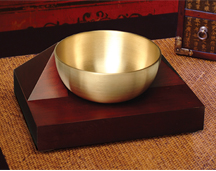 Meditation Gong Timer with Singing Bowl It fills your environment with beautifully complex tones whenever it strikes. In the morning, its exquisite sounds summon your consciousness into awakening with a series of subtle gongs that provide an elegant beginning to your day. Once you experience the Zen Timepiece’s progressive awakening, you’ll never want to wake up any other way. It also serves as the perfect meditation timer.
adapted from Body + Soul, March 2006
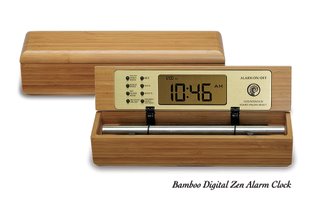
Now & Zen’s Clock Shop
1638 Pearl Street
Boulder, CO 80302
(800) 779-6383
Posted in Bamboo Chime Clocks, Chime Alarm Clocks, intention, Natural Awakening, Now & Zen Alarm Clocks, sleep, Sleep Habits
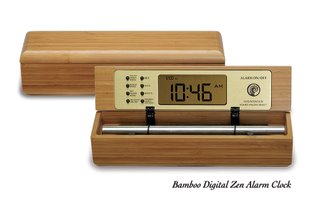 gentle awakening clock with acoustic chime Boulder, Colorado—an innovative company has taken one of life’s most unpleasant experiences (being startled awake by your alarm clock early Monday morning), and transformed it into something to actually look forward to. “The Zen Alarm Clock,” uses soothing acoustic chimes that awaken users gently and gradually, making waking up a real pleasure.
What makes this gentle awakening experience so exquisite is the sound of the natural acoustic chime, which has been tuned to produce the same tones as the tuning forks used by musical therapists. According to the product’s inventor, Steve McIntosh, “once you experience this way of being gradually awakened with beautiful acoustic tones, no other alarm clock will ever do.”
 sleeping woman using gentle awakening alarm clock Now & Zen – A Gradual
Alarm Clock Store
1638 Pearl Street
Boulder, CO 80302
(800) 779-6383
Posted in Bamboo Chime Clocks, Chime Alarm Clocks, Zen Alarm Clock
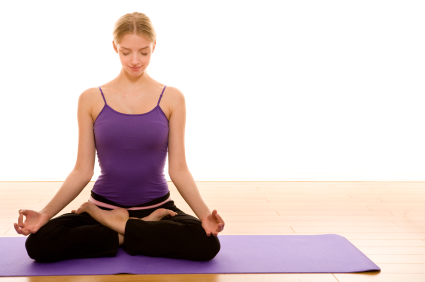 stillness practice using breath Meditation is easy in theory but fiendishly difficult in practice—unless you can give your mind a vehicle for moving inward.
By Rolf Sovik
Once your meditation posture feels relaxed and comfortable, try these five simple steps:
1. Become aware of your breathing. Feel the sensations of cleansing and nourishing that accompany each breath.
2. Relax your abdomen and rib cage so that your breathing flows effortlessly.
3. Weave each breath smoothly into the next, letting the breath flow without jerks or pauses.
4. Continue observing your breathing until you feel your nervous system relax. Maintain the smooth flow of breathing even when distractions disturb your mind.
5. Try working with the mantra soham (pronounced “so-hum”). Link the sound so… to your inhalation and the sound hum… to your exhalation. Let the breath and mantra flow together in perfect harmony, until your mind rests in the sound of the mantra.
Now your meditation will unfold in the mantra sound (so…hum…). Bringing so…hum… to awareness provides the mind with a quiet resting place during meditation. Maintaining just a sliver of awareness on the breath, along with the mantra, will help your meditation unfold.
 Meditation Timers and Alarm Clocks with Acoustic Sounds, Boulder, CO Now & Zen
1638 Pearl St.
Boulder, CO 80302
(800) 779-6383
Posted in Chime Alarm Clocks, Meditation Timers, Meditation Tools, mindfulness practice, Now & Zen Alarm Clocks
 Painting of Morpheus, Phantasos and Iris by baron Guérin - Morpheus God of Dreams & Sleep So much has been written about sleep, you’d think we’d all be wrapped in the arms of the slumber god Morpheus by now, dreaming sweet dreams and waking up refreshed. But for too many Americans a sound sleep remains, well, a dream. Instead they spend their nights tossing and turning and their days walking around bleary-eyed and exhausted.
You won’t sleep well if you don’t feel comfortable in your surroundings. This is why you should devote time to preparing the best possible sleep environment. Feng shui, the ancient Chinese art of placement and design, promotes bedrooms that are clutter-free and decorated with colors that engender feelings of serenity.
First, create a boundary around your bedroom, says feng shui expert Terah Kathryn Collins, author of The Western Guide to Feng Shui: Room by Room (Hay House, 1999). “The bedroom should be reserved for two things: sleep and romance,” she explains. Next, eliminate anything that increases activity or stimulates the mind such as TVs, computers and exercise equipment. “If you see your computer, you’ll think of emails you haven’t returned. Your treadmill will remind you that you need to work out more,” Collins says. If you must have a TV in the bedroom, place it in a cabinet with doors, so it can be out of sight when not in use. Hide any other must-haves behind an attractive, free-standing screen.
 Feng Shui, bed placement promotes relaxation Also, place your bed so you can see the door. “If the door is hidden from view, that increases anxiety,” Collins says. It also shouldn’t be directly in front of the door, but rather off to one side so that you don’t have the sense you can be easily intruded upon. The direction the bed points is also important. Collins says insomniacs should face the headboard west, which promotes relaxation and helps them to sleep past dawn. If your insomnia is depression-related, however, she suggests facing the headboard toward the east, which “speeds people up.” Sleeping with your head pointing north maintains overall balance, while south promotes intuition and dream recall.
 Ohara Koson (Shoson) 1877-1945 two carp and white lotus 1933 Colors can also affect your slumber. It’s best not to have gray, blue or pure white as the dominant color, Collins says, for the simple reason that “cool colors such as these don’t complement or ‘match’ your skin.” The problem? “Though they can be dramatic, they don’t make most people feel truly comfortable and relaxed.” Try this experiment: Find a pure white sheet and one in a skin-tone color such as beige, and hold them up to your face in front of a mirror. “Most people will notice that the skin-tone is more attractive against their skin, while the cool contrast of the white can make them look washed out and sallow,” Collins says. So choose pastel colors reminiscent of skin tones and/or the deep rich hues that come from skin tones, such as beige, chocolate brown, peach and terracotta.
Finally, make your bedroom a clutter-free zone. Remove piles of clothes and reduce that bedside stack of magazines and books to just one of each. “The more stimuli you can eliminate, the better,” she says. Collins adds that while mirrors can make rooms feel bigger and brighter, they also can be a distraction at night because reflections can be quite activating. Her suggestion: Place curtains over mirrored closet doors so they can be “closed” at night and opened during the day.
One of the ultimate Zen like experiences is waking-up from a great slumber refreshed and energized. Your mind and body are harmoniously one, both alert and focused. Having a refreshed mind and body are two keys to a natural and Zen lifestyle. Waking up in the morning should not be a loud and abrupt awakening, but rather it should be a peaceful positive experience. The right natural alarm clock can transition your deep and tranquil sleep into a serene start to consciousness. Imagine a long-resonating Tibetan bell-like chime waking you up to a beautiful morning experience.
The right alarm clock can be the most beneficial investment for you. With our Now & Zen natural alarm clock you are awakened more gradually and thus more naturally. Now & Zen is focused on creating a naturalistic lifestyle, and our clocks are an example of our philosophy.
adapted from Natural Solutions, December 2005 by Matthew Solan
 Zen Chime Alarm Clock, Digital Black Lacquer Chime Clock, clocks to make your bedroom a 'clutter-free' zone Now & Zen – The Gradual Chime Alarm Clock Store
1638 Pearl Street
Boulder, CO 80302
(800) 779-6383
Posted in Bamboo Chime Clocks, Chime Alarm Clocks, Japanese Inspired Zen Clocks, Natural Awakening, Now & Zen Alarm Clocks, Progressive Awakening, Sleep Habits
|
|
|
|